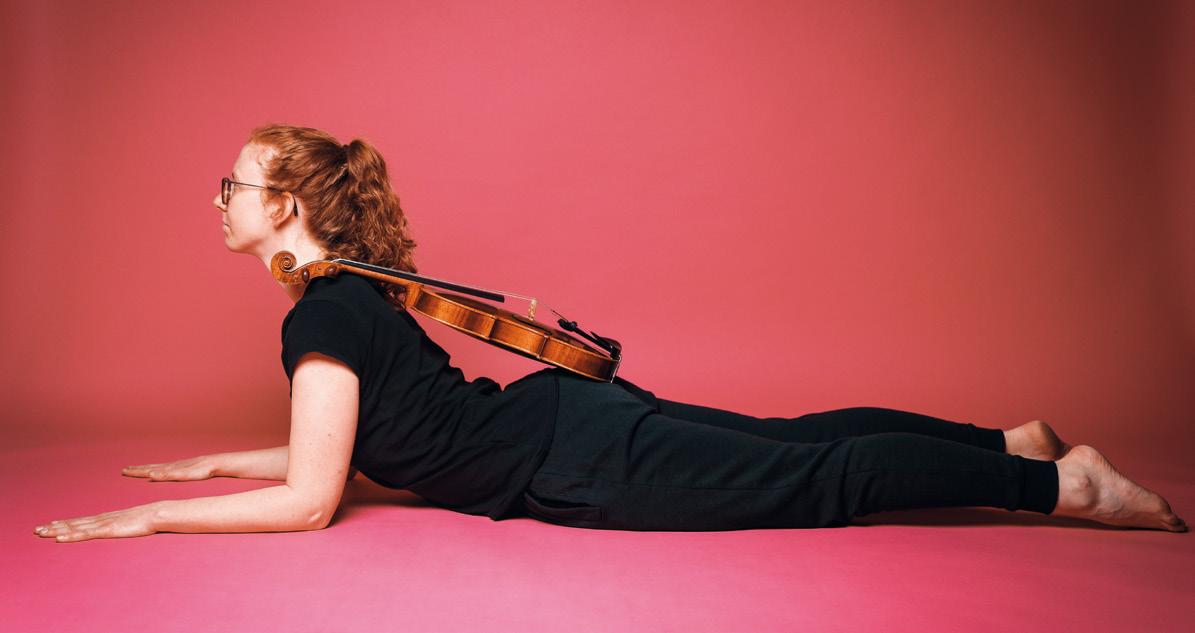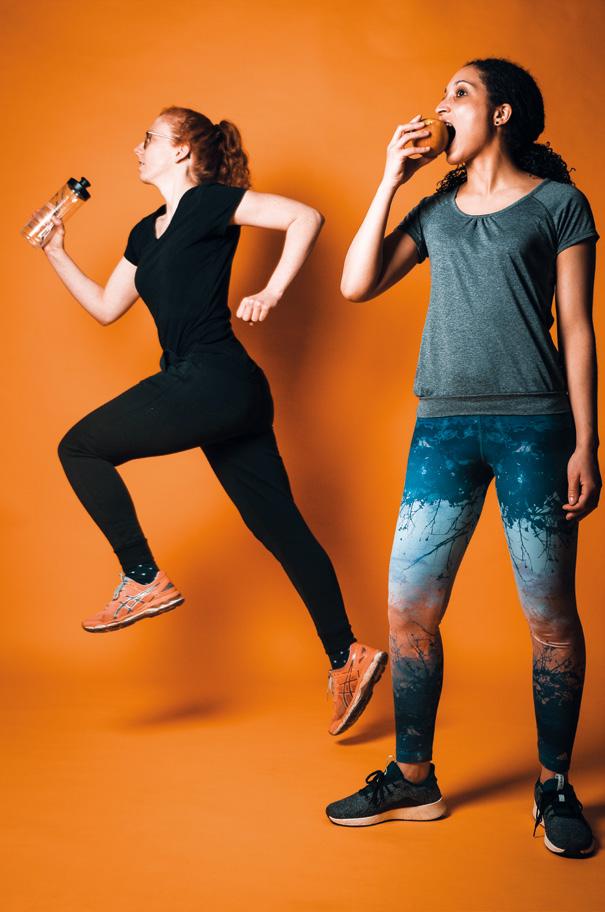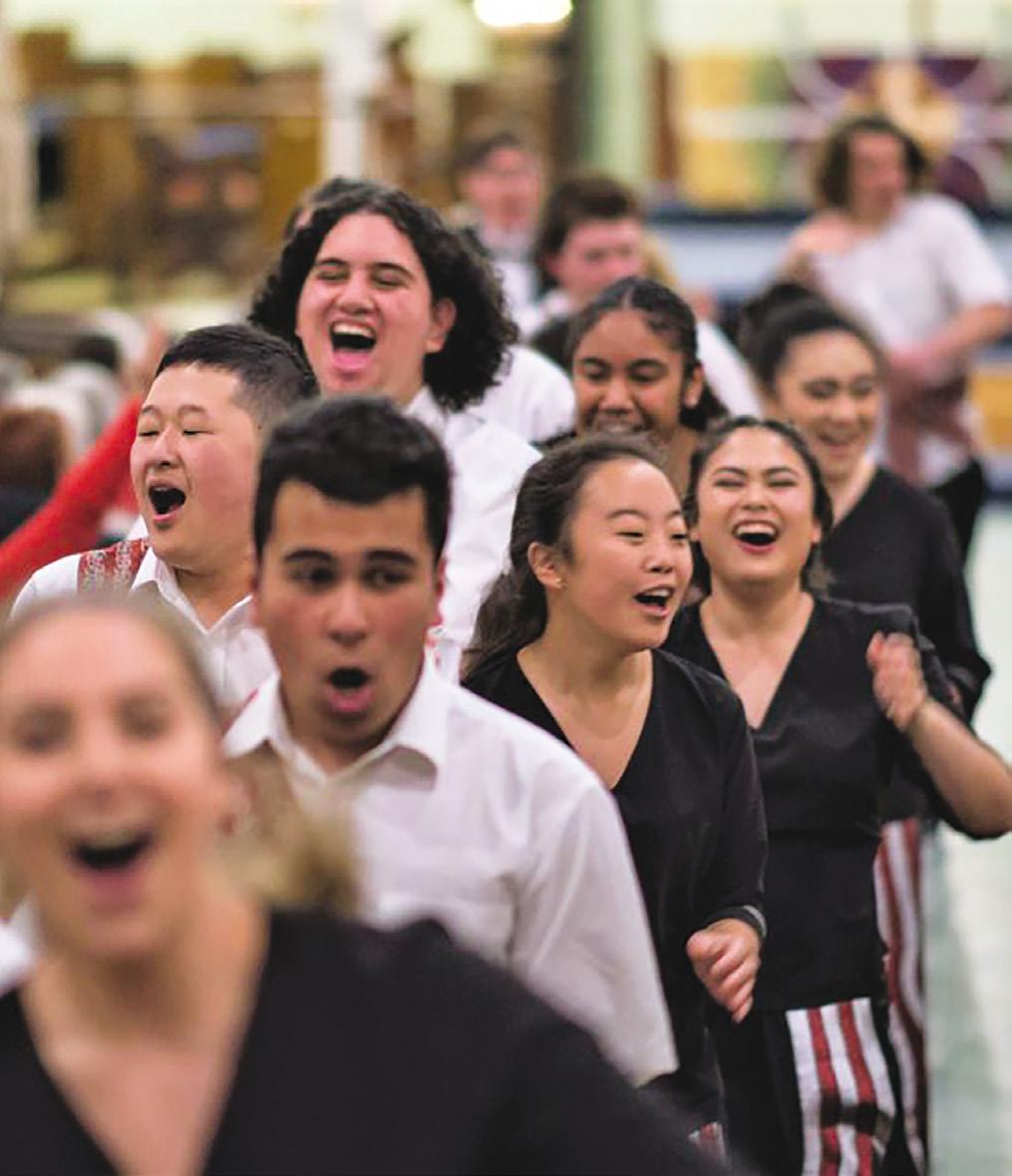
9 minute read
MUSIC HELPS. BUT WHO HELPS US?! WHEN MUSIC MAKES YOU ILL
MUSIC HELPS. BUT WHO HELPS US?!
When music makes you ill
Advertisement
ISABELLE MÉTROPE, FRANCE/GERMANY
ICB Managing Editor
Artikel auf Deutsch Artículo en español Article en français
With the various lockdowns, the public has increasingly noticed what we have known for decades: experiencing music in an active way plays a vital role in our lives – preferably live and not through a screen. It is therefore not surprising that both the previous pages of this issue and our society portray music as beneficial for health. This has now been proven through research and the practice of music therapy. Somewhat less well known – except among many professional musicians – is that making music can in some circumstances be a danger to health and that the body, like that of a competitive athlete, must be adequately taken into consideration.
Anyone browsing through medical publications will find research from as early as the 15th century on maladies typical of wind instrument players. However, for the subject to be treated in a practical and systematic way, instrumentalists and singers have to wait until the 1970s when the first musicians’ outpatient clinics open their doors. Up to two thirds of professional musicians suffer from ailments that can be ascribed to the intensive playing and practice of their instrument (Spahn/Richter/ Altenmüller, 2011, p. 2). Now, back pain, jaw tension or voice problems can happen to anyone. So what differentiates musicians from nonmusicians? Like high-performance athletes, our body is stressed in a particular way by our job: we do the same movements for up to 50 years (or more), many hours a day. Repetitive movement sequences that, just like high-performance athletes, aim at perfection (whether technical or musical) and can become dangerous. On top of that, many instruments are asymmetrical. Our body is not made for this kind of intense one-sided strain unless we allow it to compensate.
Alexander Technique, Feldenkrais, dispokinesis, gyrokinesis, yoga: the list of therapies that give balance to the body is long but in some countries these subjects have only been included in music studies for a few years or sometimes not at all. The effect of disciplines such as these could be life-changing if musical education as a whole integrated body awareness from childhood onwards: during their studies, students practise several hours a day and have often been doing so for 10 years. Among many existing methods, I recently came across one that I did not know: the Kovács method can be used even with small children and introduced into the practice routine. When the Hungarian
pedagogue and composer Zoltán Kodály discovered in the 1950s that the health of many professional musicians was suffering due to their music practice, he commissioned the scientist Dr Géza Kovács, who had already achieved good results in the healing of training injuries in the sports field, to find a solution that would both correct misalignments and prevent injuries. The Liszt Academy of Music in Budapest thus became one of the first in the world to offer prevention of injuries customised to each student. Since 2000 this method has been available to study at the Liszt Academy of Music with a view to incorporating it into one’s own teaching. If the symptoms are already well developed, a visit to the doctor is required. Musicians‘ medicine now exists in many countries, though it is a long way from being
worldwide. Many musicians’ outpatient clinics consist of a platform within a hospital, sometimes in cooperation with a university or music college. This department for musicians’ medicine brings together the appropriate specialists for each ailment in order to offer a therapy tailored to the patient. Each group of instruments tends to have its own set of symptoms: while high strings often struggle with jaw tension or poor posture in the upper back, brass players have lip or tooth problems that build up due to years of intensive playing. Drummers invest a lot in their wrists, while conductors can develop shoulder problems: arms are raised, but wrists and hands need to remain flexible and light which can increase shoulder tension. Voice problems in singers are by no means always related to vocal cords or singing technique but can result, for example, from previous gastrointestinal illnesses or even be an indicator of them.

THIS CENTREGROUND MUST BE FOUND IN ORDER TO GUARANTEE YEARS OF HEALTHY, SYMPTOM-FREE PLAYING.
This list is not intended to be exhaustive. Of course, we are not only talking about ailments here but also about prevention: the aim of musicians’ medicine is to find a happy medium between the technical requirements of instrumental practice and healthy demands on the body. This centreground must be found in order to guarantee years of healthy, symptom-free playing. The methods mentioned above can be helpful for good body awareness, healthy posture and natural movements.
Institutes of musicians’ medicine are a recent development, but the number is growing and they are becoming increasingly multidisciplinary. There are a number of national organisations (see list of links) and relevant literature is available in several languages (see book suggestions). Specialising in musicians‘ medicine can be taught as an additional qualification, for example at University College in London as part of a Master of Science or postgraduate diploma.
Only one disappointment remains: most musicians’ outpatient clinics or research centres deal extensively with physiological issues but less often with the mental health of musicians. There is research in the field of music psychology but the focus is mostly on music‘s positive psychological effect. In the end, one thing unites all musicians: what the media all too often reduce to stage fright in truth consists of a whole variety of mental challenges in a professional musician’s life. Already back in 2019, the Swedish organisation Record Union conducted a survey among almost 1500 musicians around the world and found out that "more than seven out of ten (73%) independent music makers said that they have experienced negative emotions such as stress, anxiety and/or depression in relation to their music creation" (source: Record Union, report available on www.the73percent.com).
The current pandemic has shifted the challenges: from burnout to boreout, from almost too much to almost nothing, from (over?) exertion to a forced break. Musicians who practice daily were “locked up” in their homes by lockdown measures (which for some greatly reduced the opportunity to practise) and ultimately making music, especially singing, was classified as highly dangerous. The consequences are serious: the prohibition on choir and orchestra rehearsals means that amateur and professional musicians lack an emotional balance; careers have been stopped; the passion and even the need to appear on stage is suddenly no longer satisfied for months on end; the lack of challenges and projects can lead to depression and for many people there are financial consequences that threaten their existence. Of course, a pandemic is an enormous psychological burden for everyone, not least due to the severe containment of social life. But what is currently protecting mankind from madness? Among other things, (the survival of) cultural life and the frontline workers in the health system. And someone should also be taking care of their mental wellbeing...
ASSOCIATIONS
• British Association for Performing Arts Medicine: https://www.bapam.org.uk • Performing Arts Medicine Association: http://www.artsmed.org • American Psychological Association: Society for the
Psychology of Aesthetics, Creativity and the Arts: https://www.apa.org/about/division/div10 • Österreichische Gesellschaft für Musik und Medizin: www.oegfmm.at • Schweizerische Gesellschaft für Musik-Medizin: https://www.musik-medizin.ch/ • Deutsche Gesellschaft für Musikphysiologie und
Musikermedizin e.V: https://dgfmm.org • German Society for Music Psychology: http://www.music-psychology.org • European Society for the Cognitive Sciences of Music: https://www.escom.org
INSTITUTES
• Clinique du Musicien et de la Performance Musicale,
France: http://cliniquedumusicien.com • Texas Center for Performing Arts Health, USA: https://tcpah.unt.edu • Center for Music & Medicine at Johns Hopkins University,
Baltimore (MD), USA: https://www.hopkinsmedicine.org/ center-for-music-and-medicine

• Medical Center for Dancers & Musicians in The Hague, NL: https://www.haaglandenmc.nl/specialismen/afdeling/ medisch-centrum-voor-dansers-musici • Berlin Center for Musicians’ Medicine, Germany: https://musikermedizin.charite.de • Center for pop musicians medicine at Berlin School of
Popular Arts, Germany: https://www.srh-university-berlin. de/hochschule/forschung/popambulanz-pab/ • Kurt Singer Institute for Music Physiology and Musician’s
Health (KSI), Germany: http://www.ksi-berlin.de • Institute for Music Physiology and Musicians’ Medicine
Hanover, Germany: https://www.immm.hmtm-hannover.de
EDUCATION
• Formation Médecine des Arts-musique, France: https://www.medecine-des-arts.com • University College London: Performing Arts Medicine
MSc or Postgraduate Diploma (also as distance learning) https://www.ucl.ac.uk/prospective-students/graduate/ taught-degrees/performing-arts-medicine-msc
JOURNALS
• Medical Problems of Performing Artists: Official Journal of the Performing Arts Medicine Association (PAMA), the
Dutch Performing Arts Medicine Association (NVDMG) and the Australian Society for Performing Arts Healthcare (ASPAH): https://www.sciandmed.com/mppa • Revue Médecine des Arts, France: https://www.medecine-des-arts.com
BOOKS
• Chouard, Claude-Henri, L’oreille musicienne: les chemins de la musique de l’oreille au cerveau. Collection Folio
Essais. Paris: Gallimard 2009. • Dr. Kovács, Géza, Dr. Pásztor, Zsuzsa, Hand Strains from
Instrumental Playing. Budapest: Kovács-Method Studio 2021. • Dr. Kovács, Géza, Dr. Pásztor, Zsuzsa, Ten Short Sets of
Exercises. Budapest: Kovács-Method Studio 2021. • Velazquez, Ana, Cómo vivir Sin Dolor Si Eres Músico. La
Mejor Postura. Barcelona: Ma non troppo 2013. • Vrait, François-Xavier, La Musicothérapie. Collection Que sais-je? Paris: Presses Universitaires de France/Humensis 2018.
• Sacks, Oliver, Der einarmige Pianist. Über Musik und das
Gehirn. Reinbeck: Rowolt 2008. • Sacks, Oliver, Musicophilia: Tales of Music and the Brain.
New York: Knopf 2007. • Spahn/Richter/Altenmüller, MusikerMedizin: Diagnostik,
Therapie und Prävention von musikerspezifischen
Erkrankungen. Stuttgart: Schattauer 2011.
VIDEOS
• Sarah’s Music - Music and Science: the Max Planck
Institute Göttingen uses MRI to examine the movements of musicians. Deutsche Welle 2016. https://www.dw.com/ en/sarahs-music-music-and-science/av-18404705 • Richter, Echternach, Traser, Burdumy, Spahn: The Voice:
Insights into the Physiology of Singing and Speaking.
DVD, Helbling / freiburger institut für musikermedizin an der hochschule für musik freiburg 2017. • Dr. Géza Kovács: Indoor Exercises for Beginners. DVD + Booklet. Budapest: Kovács Módszer Stúdió 2000. • Dr Zsuzsa Pásztor: Musical Movement Preparation without Instrument. Kovács Módszer Stúdió. DVD.
Budapest 2006. • Dr Géza Kovács: Rondo. Kovács Módszer Stúdió.
DVD. Budapest 2002. (all three available from http://www.kovacsmethod.com) • Dr. Pásztor, Zsuzsa, Exercise Breaks for Music
Sessions. DVD. Budapest: Kodály Institute.
Available by contacting archivum@kodaly.hu
MENTAL HEALTH INITIATIVES
• Help Musicians: https://www.helpmusicians.org.uk • key changes: https://www.keychanges.org.uk • mental health in music: https://www.mim-verband.de • MusiCares: https://www.grammy.com/musicares • Research and report by Record Union: https://www.the73percent.com/Record_Union-
The_73_Percent_Report.pdf
Translated from German by Laura Massey, UK
ISABELLE MÉTROPE is a singer, a conductor and the managing editor of the International Choral Bulletin. She studied applied languages and music management, as well as conducting, singing and pedagogy, which is the cause as well as the result of a compulsive curiousity naturally leading to a strong interest in systematic musicology. Apart from singing solo and in several professional choirs, her favorite activities includes page setting, translating, baking cakes, taking pictures and travelling around the Mediterranean. Email: icb.editor@ifcm.net
INTERNATIONAL FEDERATION FOR CHORAL MUSIC
Presentation of the new IFCM committees
Introducing the WSCM 2023 Organizing Committee E poi le parole: Renaissance











